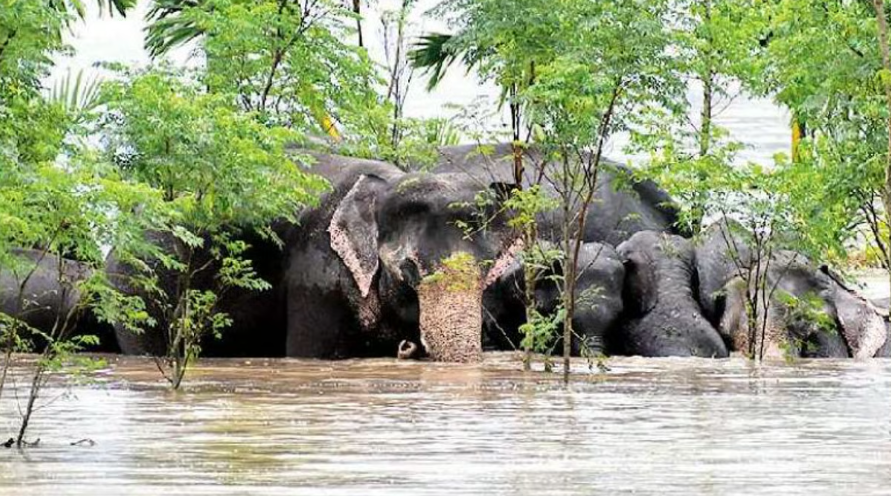The cries for survival amid disaster have erased the line between humans and wild animals. Since Saturday night, torrential rain across various parts of North Bengal has devastated normal life — and equally endangered wildlife. From elephants and rhinos to deer and bison, many creatures have lost their homes to the floodwaters. Some have taken refuge in tea gardens, some in the bamboo groves. While humans are similarly stranded in the nearby villages.
Several wild animals have died — swept away by floodwaters or fatally struck by floating logs. Yet, amid this calamity, stories of bravery have emerged: people risking their lives by jumping into raging rivers to rescue trapped animals. In Jaldapara and Madarihat, stranded tourists in lodges were rescued atop kunki elephants. Acting on tips from locals, forest officials worked late into the night to rescue rhinos from different areas.
North Bengal, a region usually known for frequent conflicts between humans and wildlife, witnessed powerful moments of coexistence in the face of disaster on Sunday. In Alipurduar, the Veluardanga slum near Ramsai Yadavpur tea estate, adjacent to Gorumara National Park, was almost washed away.
Right beside the stranded villagers, herds of bison, rhinos, and deer sought shelter throughout the day. In Ramsai Kamarghat, a herd of 12 elephants, including calves, stood helplessly on the waterlogged boundary of a flooded village, without once attempting to enter human habitation. In the Panbari boating area, many bison were trapped mid-river.
An adult rhino took shelter all day in the bamboo grove of Biren Roy’s home at Amguri Boxirdanga village, while residents somehow managed to cook and eat in that situation. Another rhino sought refuge near the Betgara railway bridge, where forest personnel have been deployed. The continuous rain has wreaked havoc in Magurmari-II Gram Panchayat of Dhupguri as the Jaldhaka river swells dangerously.
Homes have been submerged underwater. Yet, in Dakuyapara village of Magurmari, when locals saw a deer being swept away by the floodwaters, a few young men immediately jumped into the river and rescued it. Later, they informed forest officials from the Moraghat Range, who took the animal for medical treatment, with plans to release it back into the forest once it recovers. Meanwhile, the body of a rhino was found floating in Bideshipara village along the Jaldhaka River.
The forest department has begun its post-mortem. On Sunday morning, an adult rhino swam to the middle of the Jaldhaka near the Panbari boating area and temporarily took shelter on the levee. But frightened by onlookers, it slipped back into the river. A short distance away, three more rhinos, including a calf, floated downstream and took refuge in Amguri Daspara.
However, the full extent of wildlife devastation in North Bengal becomes most apparent when looking at Jaldapara and Gorumara National Parks. The two rivers that serve as lifelines for the 216.51 sq. km Jaldapara National Park, the Torsa and the Shishamara, have turned violent, flooding vast stretches of forest.
Most of the seven ranges of Jaldapara are submerged. Rhinos, leopards, bison, and countless deer have been swept away by the Torsa’s strong current. Forest officials, helpless against the surge, could only watch the struggling animals drown. Still, two rhinos managed to cross the current and reach the human settlements of Shimlabari and Suripara, saving their lives.
Meanwhile, thousands of pine logs, stored by Bhutan’s Forest Department along the Torsa River in Phuentsholing, were swept downstream into the Torsa and Shishamara rivers. The fast-moving logs have fatally struck several wild animals.
At present, patrolling teams are conducting increased surveillance of flooded areas on elephant-back. The Jaldapara Forest Division has formed special teams to rescue animals carried by the Torsa’s current toward Cooch Behar. Gorumara DFO Dwijpratim Sen said that monitoring continues for wildlife that have taken refuge in villages. Some rescued animals from the Jaldhaka and Murti rivers have already been released back into the forest, and others will be once the water recedes. Security around the kunki elephants inside Gorumara has also been strengthened.











